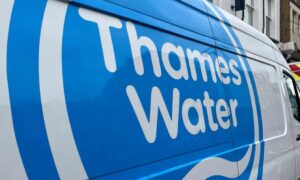
The parent company of troubled Thames Water has told its creditors it has defaulted on its debt, raising the prospect that the company could face a significant restructure or even ultimately collapse.
Kemble Water has missed an interest payment that was due on Tuesday and said it had requested that its lenders and bondholders take no creditor action so as to “provide a stable platform while all options are explored” with its stakeholders.
Britain’s biggest water company, under pressure over its sewage dumping record, said last week its shareholders had refused to pay £500m promised to stabilise its finances, heightening concerns over its survival.
Kemble is entirely funded through dividends received from Thames Water, and some of the £500m had been earmarked to pay loans owed by Kemble. Last week, Kemble said it would not be able to repay a £190m loan due by the end of April.
The price of the £400m Kemble bond, which is due to mature in 2026, has collapsed over the last year, indicating that debt holders believed the company could default. Consultants at Alvarez & Marsal are working with Kemble to assess its options and engage with lenders and bondholders over its future debt structure.
Kemble is the ultimate parent of the Thames Water operating company, which has 16m customers. The water company’s executives have said that Thames, which has nearly £15bn of debts, and its customers are insulated and it would continue to operate as normal if Kemble collapsed. It has £2.4bn of funds at hand, which would see it through to next summer, they said.
Kemble’s creditors could allow the company to “amend and extend” the £190m loan, buying time to allow a restructure. The lenders have so far refused an extension and, if Kemble defaults, they could become shareholders in the company. It emerged on Thursday that Kemble’s lenders include ING, Allied Irish Banks, the Bank of China and the Industrial and Commercial Bank of China.
The involvement of two Chinese state-owned banks could complicate the situation, as the UK government has pushed in recent years to limit Chinese ownership of critical national infrastructure. However, the China Investment Corporation is already a Thames shareholder.
A debt for equity swap with Kemble’s creditors could also be negotiated, but sources believe this option is looking increasingly less likely.
Kemble said: “The company expects that it will be in a position to provide a further update in the coming weeks.”
The government has assembled a team to study the situation amid calls for Thames to be renationalised. Rishi Sunak has so far resisted those calls and is understood to be keen for the company to solve its financial problems without state intervention.
Thames has said the industry regulator, Ofwat, is being too tough, making the company “uninvestable”. Shareholders have signalled they are willing to write off the entirety of their £5bn investment rather than pump in more funds if Ofwat does not give the company what it wants.
Thames wants to be allowed to secure significant bill rises, lower environmental fines and the ability to pay dividends up to Kemble to service its debts.
